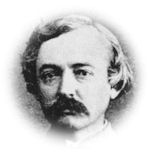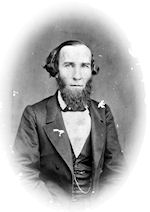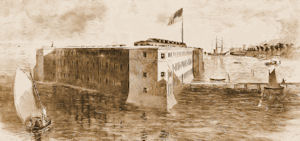NEW YORK, April 19, 1861.
COLONEL: I have the honor to send herewith dispatches Nos. 99 and 100, written at but not mailed in Fort Sumter, and to state that I shall, at as early a date as possible, forward a detailed report of the operations in the harbor of Charleston, S.C., in which my command bore a part on the 12th and 13th instants, ending with the evacuation of Fort Sumter, and the withdrawal, with the honors of war, of my garrison on the 14th instant from that harbor, after having sustained for thirty-four hours the fire from seventeen 10-inch mortars and from batteries of heavy guns, well placed and well served, by the forces under the command of Brigadier-General Beauregard. Fort Sumter is left in ruins from the effect of the shell and shot from his batteries, and officers of his army reported that our firing had destroyed most of the buildings inside Fort Moultrie. God was pleased to guard my little force from the shell and shot which were thrown into and against my work, and to Him are our thanks due that I am enabled to report that no one was seriously injured by their fire. I regret that I have to add that, in consequence of some unaccountable misfortune, one man was killed, two seriously and three slightly wounded whilst saluting our flag as it was lowered.
The officers and men of my command acquitted themselves in a manner which entitles them to the thanks and gratitude of their country, and I feel that I ought not to close this preliminary report without saying that I think it would be injustice to order them on duty of any kind for some months, as both officers and men need rest and the recreation of a garrison life to give them an opportunity to recover from the effects of the hardships of their three months’ confinement within the walls of Fort Sumter.
I have the honor to be, very respectfully, your obedient servant,
ROBERT ANDERSON,
Major, First Regiment Artillery, &c.
P. S.–I inclose herewith copies of the correspondence between General Beauregard and myself.
R.A.
Col. L. THOMAS,
Adjutant-General, Washington, D.C.

[Inclosures.]

1.]
HEADQUARTERS PROVISIONAL ARMY, C. S. A.,
Charleston, S. C., April 11, 1861.
SIR: The Government of the Confederate States has hitherto forborne from any hostile demonstration against Fort Sumter, in the hope that the Government of the United States, with a view to the amicable adjustment of all questions between the two Governments, and to avert the calamities of war, would voluntarily evacuate it.
There was reason at one time to believe that such would be the course pursued by the Government of the United States, and under that impression my Government has refrained from making any demand for the surrender of the fort. But the Confederate States can no longer delay assuming actual possession of a fortification commanding the entrance of one of their harbors, and necessary to its defense and security.
I am ordered by the Government of the Confederate States to demand the evacuation of Fort Sumter. My aides, Colonel Chesnut and Captain Lee, are authorized to make such demand of you. All proper facilities will be afforded for the removal of yourself and command, together with company arms and property, and all private property, to any post in the United States which you may select. The flag which you have upheld so long and with so much fortitude, under the most trying circumstances, may be saluted by you on taking it down.
Colonel Chesnut and Captain Lee will for a reasonable time, await your answer.
I am, sir, very respectfully, your obedient servant,
G. T. BEAUREGARD,
Brigadier-General, Commanding.
Maj. ROBERT ANDERSON,
Commanding at Fort Sumter, Charleston Harbor, S.C.

2.]
FORT SUMTER, S. C., April 11, 1861.
GENERAL: I have the honor to acknowledge the receipt of your communication demanding the evacuation of this fort, and to say, in reply thereto, that it is a demand with which I regret that my sense of honor, and of my obligations to my Government, prevent my compliance. Thanking you for the fair, manly, and courteous terms proposed, and for the high compliment paid me,
I am, general, very respectfully, your obedient servant,
ROBERT ANDERSON,
Major, First Artillery, Commanding.
Brig. Gen. BEAUREGARD,
Commanding Provisional Army.

3.]
HEADQUARTERS PROVISIONAL ARMY, C. S. A.,
Charleston, S.C., April 11, 1861.
MAJOR: In consequence of the verbal observation made by you to my aides, Messrs. Chesnut and Lee, in relation to the condition of your supplies, and that you would in a few days be starved out if our guns did not batter you to pieces, or words to that effect, and desiring no useless effusion of blood, I communicated both the verbal observations and your written answer to my communications to my Government.
If you will state the time at which you will evacuate Fort Sumter, and agree that in the mean time you will not use your guns against us unless ours shall be employed against Fort Sumter, we will abstain from opening fire upon you. Colonel Chesnut and Captain Lee are authorized by me to enter into such an agreement with you. You are, therefore, requested to communicate to them an open answer.
I remain, major, very respectfully, your obedient servant,
G. T. BEAUREGARD,
Brigadier-General, Commanding.
Maj. ROBERT ANDERSON,
Commanding Fort Sumter, Charleston Harbor, S.C.

4.]
Fort SUMTER, S.C., April 12, 1861.
GENERAL: I have the honor to acknowledge the receipt by Colonel Chesnut of your second communication of the 11th instant, and to state in reply that, cordially uniting with you in the desire to avoid the useless effusion of blood, I will, if provided with the proper and necessary means of transportation, evacuate Fort Sumter by noon on the 15th instant, and that I will not in the mean time open my fires upon your forces unless compelled to do so by some hostile act against this fort or the flag of my Government by the forces under your command, or by some portion of them, or by the perpetration of some act showing a hostile intention on your part against this fort or the flag it bears, should I not receive prior to that time controlling instructions from my Government or additional supplies.
I am, general, very respectfully, your obedient servant,
ROBERT ANDERSON,
Major, First Artillery, Commanding.
Brig. Gen. BEAUREGARD,
Commanding.

5.]
FORT SUMTER, S.C., April 12, 1861—3.20 a.m.
SIR: By authority of Brigadier-General Beauregard, commanding the Provisional Forces of the Confederate States, we have the honor to notify you that he will open the fire of his batteries on Fort Sumter in one hour from this time.
We have the honor to be, very respectfully, your obedient servants,
JAMES CHESNUT, JR.,
Aide-de-Camp.
STEPHEN D. LEE,
Captain, C. S. Army, Aide-de-Camp.
Maj. ROBERT ANDERSON,
U. S. Army, Commanding Fort Sumter.

6.]
FORT SUMTER, S.C., April 13, 1861—20 min. past 2 o’clock.
GENERAL: I thank you for your kindness in having sent your aide to me with an offer of assistance upon your having observed that our flag was down–it being down a few moments, and merely long enough to enable us to replace it on another staff. Your aides will inform you of the circumstance of the visit to my fort by General Wigfall, who said that he came with a message from yourself.
In the peculiar circumstances in which I am now placed in consequence of that message, and of my reply thereto, I will now state that I am willing to evacuate this fort upon the terms and conditions offered by yourself on the 11th instant, at any hour you may name to-morrow, or as soon as we can arrange means of transportation. I will not replace my flag until the return of your messenger.
I have the honor to remain, very respectfully, your obedient servant,
ROBERT ANDERSON,
Major, First Artillery, Commanding.
Brig. Gen. G. T. BEAUREGARD,
Charleston, S.C.

7.]
HEADQUARTERS PROVISIONAL ARMY, C. S. A.,
April 13, 1861—5 min. to 6 o’clock p.m.
SIR: On being informed that you were in distress, caused by a conflagration in Fort Sumter, I immediately dispatched my aides, Colonels Miles and Pryor, and Captain Lee, to offer you any assistance in my power to give.
Learning a few moments afterwards that a white flag was waving on your ramparts, I sent two others of my aides, Colonel Allston and Major Jones, to offer you the following terms of evacuation: All proper facilities for the removal of yourself and command, together with company arms and private property, to any point within the United States you may select.
Apprised that you desire the privilege of saluting your flag on retiring, I cheerfully concede it, in consideration of the gallantry with which you have defended the place under your charge.
The Catawba steamer will be at the landing of Sumter to-morrow morning at any hour you may designate for the purpose of transporting you whither you may desire.
I remain, sir, very respectfully, your obedient servant,
G. T. BEAUREGARD,
Brigadier-General, Commanding.
[Maj. R. ANDERSON,
First Artillery, Commanding Fort Sumter, S.C.]

8.]
HEADQUARTERS, FORT SUMTER, S. C.,
April 13, 1861—7.50 p.m.
GENERAL: I have the honor to acknowledge the receipt of your communication of this evening, and to express my gratification at its contents. Should it be convenient, I would like to have the Catawba here at about nine o’clock to-morrow morning.
With sentiments of the highest regard and esteem, I am, general, very respectfully, your obedient servant,
ROBERT ANDERSON,
Major, U. S. Army, Commanding.
Brig. Gen. G. T. BEAUREGARD,
Commanding Provisional Army, C. S.

9.]
HEADQUARTERS PROVISIONAL FORCES, C. S. A.,
Charleston, April 15, 1861.
The commanding general directs that the commanding officer of the garrison of Fort Sumter will bury the unfortunate soldier who has been accidentally killed by explosion of misplaced powder while saluting his flag. He will be buried with all the honors of war in the parade of the fort.
By order of Brigadier-General Beauregard:
W. H. C. WHITING,
Adjutant and Engineer General.
Copy furnished to–
Major ROBERT ANDERSON, U. S., First Regiment of Artillery.

P. S.–The wounded will receive the best attention, and will be placed in the State hospital.
By order of General Beauregard:
W. H. C. WHITING,
Adjutant and Engineer General.









